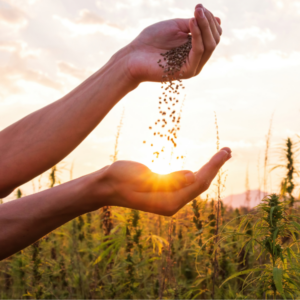9 CBD Myths, Debunked by Science (and Common Sense)
The growing popularity of cannabidiol (CBD) over the years has resulted in more interest in selling CBD – and that has translated into more disinformation on the web.
This article is going to debunk 12 of the most common CBD myths in addition to providing fact-based information rooted in science.
1. CBD comes from marijuana
CBD comes from hemp. Along with marijuana, hemp belongs to the cannabis genus of flowering plants. While the cannabis plant is also generally known as “hemp”, this term is often referred to as cannabis varieties that are cultivated for non-drug use.

3. CBD converts into THC
Cannabinoids are the neurotransmitters used by the endocannabinoid system in the body. At least 113 different cannabinoids have been isolated from the cannabis plant and THC and CBD are two of those cannabinoids. There is no “conversion” that takes place because they are two different substances with entirely different chemical structures.
5. There’s no science backing CBD
This statement gets thrown around a lot, especially by mainstream doctors that haven’t really looked into the subject.
Here is a brief summary of some of the claims made about CBD, along with some relevant scientific studies:
Inflammation
CBD is thought to have strong anti-inflammatory effects, giving it a strong reputation as a powerful anti-inflammatory compound. Since inflammation is at the root of many adverse health conditions, CBD is considered to be effective for treating pain-related symptoms associated with many diseases. Click here to read an extensive review of the effects of CBD on inflammation.
Epilepsy
Epilepsy is a chronic nervous system disorder that results in seizures, defined as sudden rushes of electrical activity to the brain. A notable research study from 2016 revealed an 89% reduction in seizures among 74 people with treatment-resistant epilepsy after being given CBD-enriched hemp oil for an average of 6 months.
Multiple Sclerosis
Multiple sclerosis (MS) is a disease that affects the brain and spinal cord with the potential to cause permanent damage/deterioration of the nerves. Scientific research has gone far in investigating the effectiveness of CBD for controlling symptoms, leading to the creation of pharmaceutical drugs using cannabinoids.
7. CBD requires a prescription
The legality of CBD varies throughout the world, however in countries where it is fully legal a prescription is not required.
9. CBD cures diseases
CBD relieves pain through its action on the endocannabinoid system. While many believe it is very effective, it is not a cure. Diseases at their root have a multitude of causes that are best explored by the patient with a holistic health practitioner. In the interim, many people opt for CBD instead of chemical-based pain relievers.

2. CBD gets you high
CBD does not cause feelings of euphoria (i.e. getting “high”). Tetrahydrocannabinol (THC), the active ingredient in marijuana, has the strong psychoactive properties that create these sensations.
Many varieties of hemp have been bred to contain high amounts of CBD, but in order to keep them legal, the levels of THC are less than 0.3%. This is due in part to reduce any psychoactive effects in addition to conforming to most global laws allowing CBD products.
4. CBD makes you fail drug tests
This is mostly a myth, however the type of drug test comes into play when confronting this issue. Most drug tests administered for employment reasons test for THC. Since CBD products contain less than 0.3% THC, there is a possibility that it will turn positive – but this depends greatly on the sensitivity of the test. A positive result also requires the consumption of a lot of CBD in order to produce this result.

Add Your Heading Text Here
Anxiety and panic attacks can be thought of as a natural response to stress that brings sudden feelings of fear and instability. This 2019 study on CBD published results that showed how 80% of the 72 adults studied showed decreased anxiety within one month of using CBD.
Pain Management
CBD works on the endocannabinoid system, providing relief from pain through its action on the cannabinoid receptors. Numerous clinical studies using CBD to treat pain have been conducted and this notable review reviews all the recent research.

6. CBD is illegal
While many countries prohibit psychoactive marijuana, CBD has made major headway and is currently legal in several countries that include the European Union, the United States, Canada and the United Kingdom.
8. Isolated CBD is more effective
There is currently a debate surrounding the issue of isolated CBD and if it is more effective than “full spectrum” or “broad spectrum” CBD.
Full spectrum CBD contains all the natural compounds found in cannabis including all the cannabinoids, essential oils and terpenes. Some people prefer this format in order to obtain what they believe is a full range of effects known as “the entourage effect”.
Broad spectrum CBD is full spectrum CBD without the psychoactive THC component.
Isolated CBD is just pure CBD isolated from the cannabis plant.
There is no clear answer if one format is better than the other as they all have different effects. Extensive formal research has not been conducted on this issue, so it is up to the consumer to decide what is right for them – preferably following the advice of a natural health practitioner.





